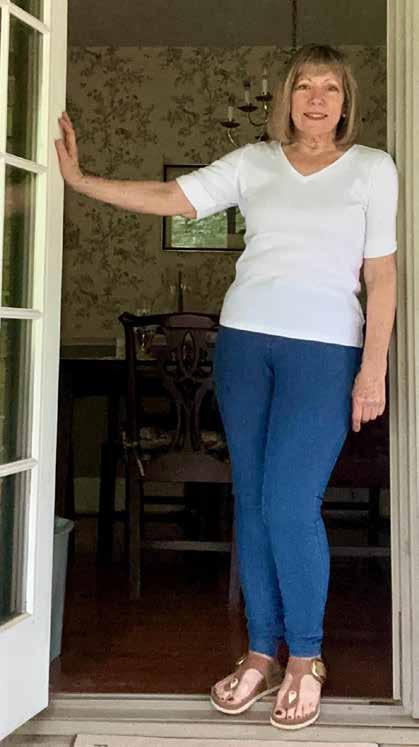Our Foodie Issue
FOOD + BEVERAGE TOASTING LOUDOUN’S HOT BREWERS

THE FIRST FIRST LADY OF VIRGINIA WINE
OCTOBER 2023



















FOOD + BEVERAGE TOASTING LOUDOUN’S HOT BREWERS

THE FIRST FIRST LADY OF VIRGINIA WINE
OCTOBER 2023



















We're the bank for that.
For the rest of 2023, our branches have chosen a charity to support through the #GiveWithBoC campaign. Show your support and consider giving at your local branch!
#BankLocal #GiveWithBoC

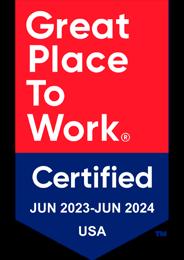
October 2023
PUBLISHER
Hann Livingston | hann.livingston@citylifestyle.com
EDITORIAL COORDINATOR


Melinda Gipson | melinda.gipson@citylifestyle.com
It’s a common refrain among Loudoun County Brewers: community is central to their existence, and why they’re in the beer business in the first place. Our “Hot Brewers” feature in this year’s Foodie Issue is a testament to that spirit, because it was spawned by Ocelot Brewing Co. owner Adrien Widman. He told us that he’s always wanted to do a brewers’ calendar for charity.
The suggestion aptly came at the 20th Anniversary party he hosted for Loudoun Cares ( loudouncares.org ) in July. And it came with photos! Friends of his among the plucky brewers of San Diego, possessed of a fiendish wit, had already produced such a calendar complete with brawny brewers and strategically placed kegs. While the SoCal version of this concept might have been a bit racy for a family magazine, we said, “Why not?
It’s for charity!” Armed with the assistance of Chris Suarez, Bear Chase GM and chair of the Loudoun County Brewers Association, and the talent of portrait photographer Mary Lanaghan (MJLStudios), we were off on an adventure: a dozen world-class breweries in less than three weeks.
We sincerely hope that our readers recognize our PG re-interpretation of the SD Brewers' project — combining editorial with a separately published calendar — for exactly what it is: the heartfelt desire of some world-class craft brewers to have a bit of self-deprecating fun while helping their neighbors in need. In both, we celebrate the best of local craft brewing along with brewers' genuine commitment to community service. Participating brewers all volunteered to cover the cost of printing, and to donate all proceeds to Loudoun Cares, an organization that connects those who serve with those in need in Loudoun County to build a stronger community.
We hope to release the calendar November 5th at a “Sunday Funday” benefit for Loudoun Cares at Lost Barrel Brewing in Middleburg and at participating breweries thereafter. We hope that, wherever you see it available, that you’ll pick up several to use as Christmas gifts!
We promise that it will be packed with reminders of many things we celebrate here in Loudoun County, including the fact that a truly extraordinary lifestyle involves giving back.
GIPSON, EDITOR @LEESBURGLIFESTYLE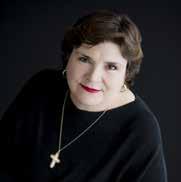
CHIEF EXECUTIVE OFFICER Steven Schowengerdt
CHIEF OPERATING OFFICER Matthew Perry
VICE PRESIDENT OF SALES Tiffany Slowinski
EXECUTIVE DIRECTOR OF HR Janeane Thompson
DIRECTOR OF FIRST IMPRESSIONS Jennifer Robinson
TECHNICAL DIRECTOR Josh Klein
CONTROLLER Gary Johnson
AD DESIGNER Matthew Endersbe
LAYOUT DESIGNER Kirstan Lanier


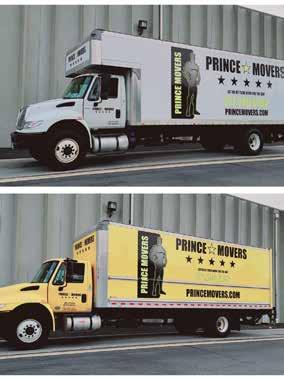


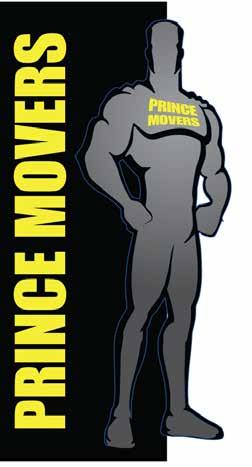


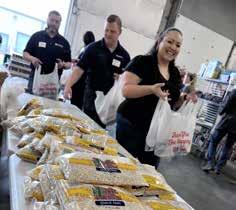
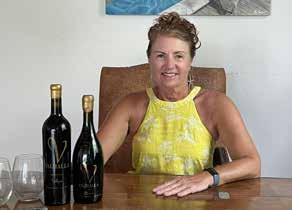

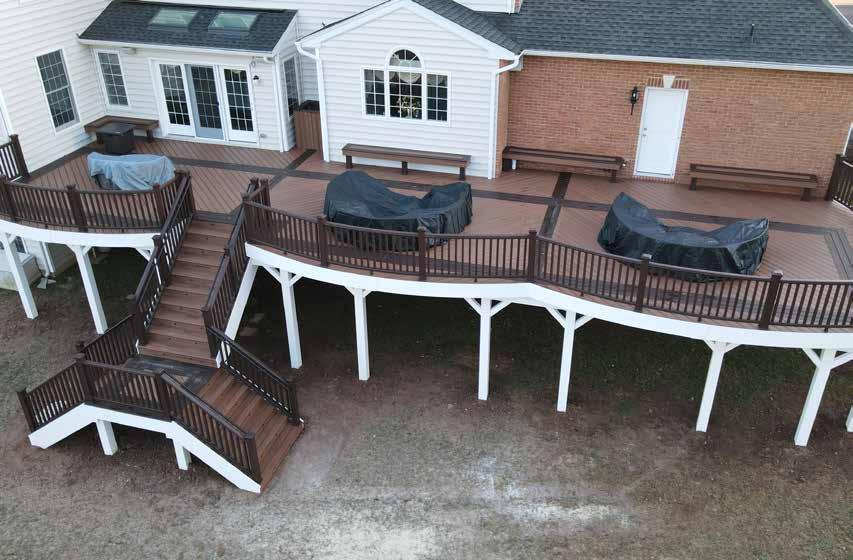







Each patient that walks through the door receives a personalized treatment based on their medical condition, symptoms, and diagnosis tools. Dr. Brown and his team’s goal is to help as best they can. In creating the treatment plan, Dr. Brown takes into consideration the patient as a whole while working in sync with other healthcare practitioners: osteopaths, physical therapists, dentists, internist, and others. The perspective is to have a whole-body approach for into symptom relief.


Dr. Brown understands sleep apnea and how it correlates to TMJ treatment. His knowledge in the combined fields of TMJ, sleep and orthodontics has given him a perspective unlike most other practitioners who perform basic dentistry. In addition, he has also learned the advanced techniques involved in expanding an airway so that both children and adults can breathe better.

a focus in TMD and sleep apnea disorders, Dr. Jeffrey Brown’s office, Sleep and TMJ Therapy, focuses on what they do best!
A round-up of exciting news from local businesses.
Announcing Harpers Mill, the new residence building coming soon to Ashby Ponds,® the premier senior living community in Loudoun County. These 110 new apartment homes include beautiful quartz countertops, new cabinet finishes, screened porches, and indoor, reserved parking.

Don’t wait to learn more! Call 1-800-966-1503 for your free brochure.


The Loudoun County Brewers Association in August hired its first Executive Director, Kevin Anderson, a former Special Agent with the Virginia Alcoholic Beverage Control’s Bureau of Law Enforcement and later industry compliance consultant. His core values are community, innovation, and sustainability. “We aim to build a robust network that doesn't just support brewers but also actively involves our Allied Trade Members and the community at large. By providing educational resources, fostering industry partnerships, and advocating for pro-business regulations, we want LCBA to be the catalyst for setting Loudoun County as the MidAtlantic hub for craft brewing.”
Ashburn, VA AshbyPonds.com


Feast both your eyes and taste buds at the 5th Annual Loudoun Cares Art Auction on October 14th at the Center of Innovation Technology. The remarkable evening will feature the gourmet creations of local Chefs Tarver King and Nathan Shapiro, alongside the awe-inspiring work of local artists, many of whom will join the gathering in giving back to the Loudoun community. Tickets are available at bit.ly/ LoudounCaresArt
Photography: Melinda Gipson
Scan to read more.
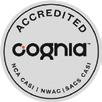
Get in touch by heading over to our landing page to connect: CityLifestyle.com/Leesburg

22900






(703)




The internet is buzzing with stories of celebrities and TikTok creators losing weight using medical weight loss injections, known as semaglutide but marketed as Wegovy or Ozempic. The injections promise to help people drop weight with minimal effort, but they aren’t without side effects or long-term drawbacks.
Before noting some precautions, let’s be clear: I believe not only that the BeBalanced weight loss program takes a more natural approach to losing weight and keeping it off, but that it also can be a potent adjunct to weight loss injections if the latter work for you. I personally lost more than 50lbs 4 years ago and have kept it off! I feel and look younger and healthier, I was borderline diabetic and now well in the normal range.
The way injections work is by helping to regulate blood sugar levels and decrease appetite – while you’re on the medication. Ozempic and Wegovy belong to a class of medications known as glucagon-like peptide-1 receptor agonists, or GLP-1 They mimic the GLP-1 hormone, which is released in the gut in response to eating.
One role of GLP-1 is to prompt the body to produce more insulin, which reduces blood sugar (glucose). For that reason, health care providers have used semaglutide to treat Type 2 diabetes. But GLP-1 in higher amounts also interacts with the parts of the brain that suppress your appetite and signal you to feel full. When used in conjunction with diet and exercise, it can increase weight loss in people who are obese or overweight. On average, the loss can be as great as 15% of your body weight over 15 and a half months. (That’s 30 pounds for a 200-pound person over 68 weeks.)
At BeBalanced, we believe that losing weight, especially for women over 40, is more than a function of calories in vs. calories expended, or medications that mimic hormone production. We’ve demonstrated that you can stimulate your body to produce the right hormones that help you lose weight simply through natural supplements, stress management and the types and amounts of foods that you eat. In the case of our actual clients, that weight loss averages 15-21 pounds in the first 30 days, all without the nausea, vomiting, diarrhea, abdominal pain, headache, fatigue, dizziness, heartburn and other common complaints associated with weekly injections.
Other longer-term impacts of injection-based weight loss can include a decrease in muscle mass and bone density, and a lower resting metabolic rate, all conditions commonly associated with aging. The bigger problem for most patients is that, after they stop taking the injections, they are prone to gaining back even more weight than they’ve lost!
Research published last spring in the journal Diabetes, Obesity and Metabolism ( https://bit.ly/DOandM ) indicates that once people stop using Wegovy or Ozempic, any weight they’ve lost is likely to return. According to the study authors, these findings reinforce the need to continue treatment to maintain the benefits of the medication.
Who really wants to live the rest of their life on injections? While a medication can make you feel less like eating, it can’t tell you what to eat to maintain a healthy weight, energy and hormone levels. But the BeBalanced program can. In lieu of or following medication that overrides your body’s natural ability to balance blood sugar and curb cravings, a holistic approach and easy-to-follow dietary instructions involving right-sized portions of proteins, fruits, vegetables, carbs, and healthy fats, can work with your body to bring it into balance naturally. I can’t tell you how often I’ve counseled people who tell me, “I know what NOT to eat, but nobody will tell me what I should eat to further or maintain my weight loss!” I’ve helped so many, just like you. We not only can answer that question, and for a small fraction of the cost of weight loss injections, we have a recent survey to prove it!
• The average weight lost in the first 30 days of the Becoming Balanced program: 18.01 lbs.
• Percentage of clients who said that the program was manageable: 97%
• Percentage of clients who maintained their weight loss for more than 6 months: 62%, compared with the national average percentage of people who lose weight and keep the weight off for more than a year of 20%.
• 74% said their mood improved, 82% said their sleep improved, 82% had more energy, 74% reduced hot flashes and night sweats, 71% experienced less bloating and fluid retention.
• And, the percentage of clients who reported they would recommend BeBalanced: 92.45%
ARTICLE BY JAN BENJAMIN | PHOTOGRAPHY BY MELINDA GIPSON


 TOP: Jan Benjamin, BeBalanced Leesburg
TOP: Jan Benjamin, BeBalanced Leesburg


A year-long, in-person business educational program for women business owners. Providing hands on business training, a supportive women’s community, and structured accountability to build the foundational framework for a sustainable business that will withstand all market conditions.
The Women’s CEO Business School was NOT what I was expecting. THIS IS BY FAR ONE OF THE BEST INVESTMENTS I HAVE MADE IN MYSELF & IN MY BUSINESS! The most remarkable experience is the long lasting relationships I have built with other like minded female badass bosses!
Erica P. Rowe, CEO, Business Brand Ambassador

My experience in the Women’s CEO Business School has been mind blowing from day one. I have learned things not only about my business and how to grow it, but also about myself and how to improve my mindset. This program has improved my business, and I have been able to double my gross revenue from the year before.

 Dr. Kajal Roy, CEO, Niyan Medspa
Dr. Kajal Roy, CEO, Niyan Medspa

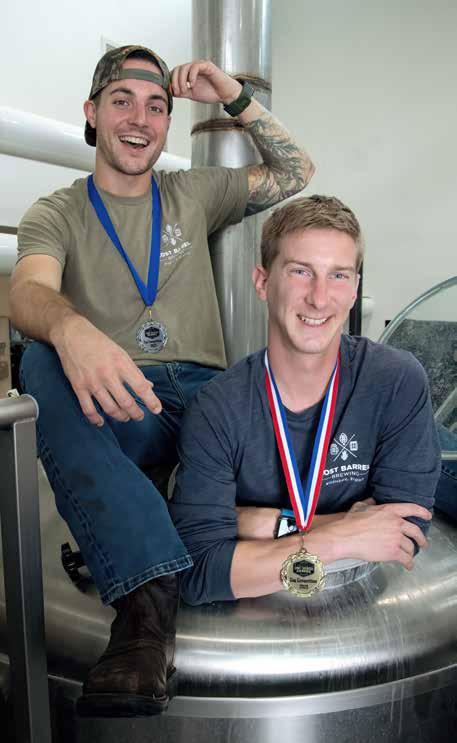 ARTICLE BY MELINDA GIPSON | PHOTOGRAPHY BY MJLSTUDIOS
ARTICLE BY MELINDA GIPSON | PHOTOGRAPHY BY MJLSTUDIOS
With 37 craft brewers to choose from, we’ll allow that our selection of 12 was in part arbitrary. We started with Loudoun winners of this year’s Virginia Craft Brewers Guild Awards, absent Dirt Farm Brewing (first place in Fruit for Peachy Mother Pucker and second in Alternative Grains or Sugars for Honey Helles) and Sweetwater Tavern’s third place Painted Lady Lager and first place Barking Frog Kolsch. All the 2023 award winners are here: bit.ly/VCBG2023. The rest have all won their share of medals and produce some of the best craft beers anywhere, and are exceedingly good sports besides.
Dan Sickmen, Head Brewer of Lost Barrel Brewing, and Patrick Murphy, Assistant Brewer, both came away with hardware from this year’s VCBA, Dan for a first for Stratazacca Double IPA and Patrick a second for Lost Barrel Hazy IPA. Both are among the most popular beers among beer drinkers and so enjoy the greatest amount of competition in the category. It’s the brewery’s second consecutive awards in IPAs and fourth in the three years it’s been open.
Dan left his job as a landscaper to try brewing on the advice of a friend. “It was a leap of faith. I enjoyed drinking beer so I began as his apprentice and ended up as head brewer.” If that sounds easy, Patrick is quick to point out that Dan both excels at brewing and at creating the kind of collaborative culture that makes him a joy to work with. “Just call it raw talent and big muscles and a nice smile. And the ladies love him,’ Patrick quips. Both laugh. Neither looks like he is out of his 20s.
Dan says, “I get that a lot. I’ll go to buy beer and people will ask me if I’m old enough. Well, I’m actually 30!” Both knew each other in high school in Fairfax but were brought together individually by third parties
behind Lost Barrel. The Double IPA is Dan’s “baby,” so he explains: “It’s named for the two kinds of hops it contains, Strata and Azacca, both tropical tasting hops. It’s a higher ABV beer, sitting at around 9% alcohol, but we offset the bitterness and made it a lot more sweet, about 10 IBU (international bitterness units). It doesn’t taste like a double so it’s very deceiving.”
Agrees Patrick, “When you have a stronger alcoholic beer, you get what everybody calls a bite. We found a way to cut that with the hop combination we chose. It’s a very smooth drink; you could drink it all day long.” Patrick, who studied journalism in college says, “like many journalists didn’t get a job in journalism right out of school.” After taking a six-week trade school program as a heavy equipment operator, he began work clearing land in the area, but the job was taking a toll on him physically. When the opportunity to work on Lost Barrel’s working equestrian training facility opened up, he began as a farm hand, then migrated to the brewery.
They like to say they have something for everyone –beers from light lager to stouts and porters and everything in between. And, when we say everything, they were just about to brew a pumpkin ale for the holidays. Dan says, “It’s actually one of my favorite beers to brew because we add a lot of pumpkin spice to it. The whole building smells like pumpkin pie. It’s a nice time to be here.” The brewery also grows some of its own hops with which it makes a “Harvest IPA” in the fall.
For anyone looking to follow in their footsteps, Dan cautions that it’s a lot of work, but “just trust your instincts. You can be as creative as you want to be. There is no limit to what you can do with a beer. You can mix and match any ingredient you want with any sort of hops. It’s really limitless what type of beer you can make.”
Nearly every Sunday, the brewery celebrates “Sunday FUNDay” where it donates a portion of all the afternoon’s proceeds to a local charity, so it’s there that we’ll be releasing the calendar in November. Check their website for details.
Drinking an Oktoberfest Kodiak Kolsch at Bear Chase Brewing Co. in Bluemont is as transporting an experience as one could wish for in all of Loudoun County. First, the view. The 33-acre, east-facing overlook on the Blue Ridge offers a mountain-top view of the entire county; on a clear day, you can see Reston. Property owners, five friends who bought the property in 2017 as a bed and breakfast, have optimized the land for lounging, peppering the slope down from the semi-circular tap room pavilion with Adirondack chairs and rough-hewn benches upon which to perch your beer and food. For a visual, imagine the Starship Enterprise landing in paradise.
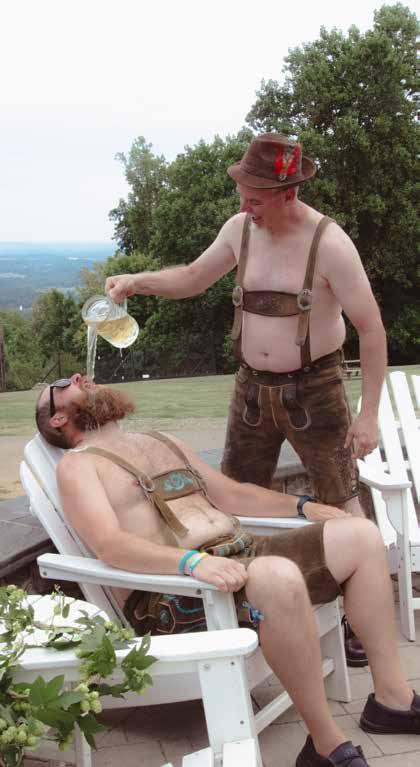
And then, there’s the beer. Oktoberfest Marzen took gold at the Great American Beer Festival in both 2019 and 2021, and their Kodiak Kolsch a silver multiple times, from the World Beer Cup, to GABF and is a perennial contender in the Virginia Craft Brewers Guild Awards. Their Oktoberfest has the caramel-colored brew translates to a smooth, malty blend that is easy to drink. Despite the brewery’s 25 or so different brews on tap, the Marzen will constitute 30% of beer sales through Thanksgiving, when this seasonal brew will again vanish until next year.
Ken Wilson, the head brewer and production manager at Bear Chase, has been making beer there for five years, but has been home brewing since the ‘90s. He came to the job as a certified sommelier from The Culinary Institute of America, from which he also has an Associate’s Degree. Prior to that, he graduated from the Harvard School of Business in Hospitality Management. Not content to rest on his laurels, he recently completed the Advanced Brewing Theory Program at the World Brewing Academy from the Siebel Institute of Technology. It takes true fascination with the finer points of brewing to thrive on 25 hours per week of lectures on advanced commercial brewing techniques, packaging raw materials, quality control, sanitation and yeast management, but Ken is now all about the life cycle of yeast.
Ken’s priority, on all his beers, is drinkability, but at heart, he’s “kind of a German Pilsner guy.” He explains, “There’s a lot of craft beer out there – in your face using big bold flavors or you know, peanut butter and jelly and all these things. But we’d like to focus on beers that you can sit down and relax and have more than one. They’re just smooth and clean and drinkable.” Last year Bear Chase sold 1800 barrels, or 3600 kegs, 95% of it on property with a small distribution to local bars.
Chris Suarez, Bear Chase general manager, has likewise been in the hospitality industry his whole career, and turned his hand at home brewing. Like Ken, whom he met while they were working at Lansdowne Resort, he vastly prefers hospitality on a smaller scale. His winsome personality and generous spirit –led him to chair the Loudoun Brewers Association, a group that in August took the next step in its growth by hiring its first executive director, Kevin Anderson (see Business Briefs.)
Chris says the county’s brewers all have true community spirit that translates itself into ready
willingness to apply their skills in raising money for charity. “We’re all very community centric. We’ve raised $31,000 for suicide awareness,” he said, and 8 or 9 brewers plan a collaboration for a special brew to benefit LAWS, Loudoun’s Domestic Violence & Sexual Assault Services organization. His assistance in helping Leesburg Lifestyle compile a “Hot Brewers” calendar benefitting Loudoun Cares was invaluable –think “cat herding,” but where all the cats work 7 days a week, 10 hours a day. One of his hopes for LCBA would be just more opportunities to get together because “we genuinely enjoy each other’s company.”
Ken agrees, adding, “A lot of times you’ll drink a great beer and then ask, ‘Wow, how did you do that?’ and a local brewer will tell you.” It’s a common theme among brewers we met for this project: it’s a big county, and we’re all thirsty for a great beer.
One of the first things to catch your eye at Quattro Goombas – besides the massive parking lot, which we assure you was packed during their Oktob erfest in September – is the gleaming, 20-tap draft system installed in 2017. When head brewer Chris Jacques came to Quattro, he found a small draft system only pouring 10 beers that was “not quite up to standards” and not easy to clean during his bi-weekly cleaning regime.
But that’s the thing about Chris generally. Like all brewers, he’s a “freak perfectionist” about pretty much everything. He is also a certifiable change agent, having quadrupled beer sales since joining Quattro Goombas in 2017. Since then he’s brewed about 2500 barrels, all sold from the brewery another reason Chris is justly proud of his draft system. He likes to tout that he personally has brewed about a quarter million barrels in his professional career. In 2018, beer out-sold the winery for the first time in its history, “There’s definitely some friendly competition between the wine maker, which is good fun.”
The only brewer we spoke to who hadn’t first been a home brewer, Chris became a professional brewer straight out of school at the University of Rhode Island with a degree in resource development with a specialization in food science. It was then the late 90s when the craft brew craze was at its peak in New England because of the success of beers like Sam
Adams and Dogfish, and breweries were intent on hiring quality control and quality assurance managers, using university students in their programs. His professors first started a fermentation lab offering students the choice of brewing beer or making bread. Most chose the beer.
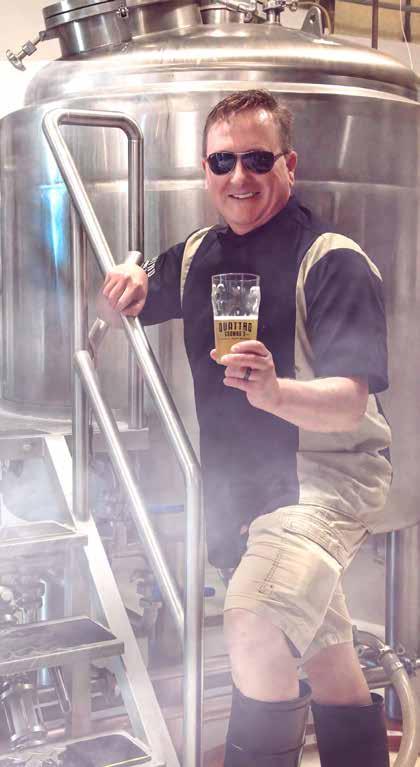
Then Chris’ microbiology professor asked him if he’d be interested in helping with a yeast propagation program they’d begun. That project drew a visit from Tim Morse, who had been the head brewer at Anchor brewing company in San Francisco. Chris calls him “one of the pioneers of the craft brewing industry,” and “the one who really taught me how to brew,” so he followed him to John Harvard’s Brewery and Ale House in Massachusetts upon graduation and worked there for a decade. There, he won his first gold medal at the Great American Beer Festival. He later developed the Czernobog Russian Imperial Stout for Harpoon, which remains their second-highest selling specialty beer, and originally sported Chris’ photo on the label.
Rock Bottom brought him to Arlington, and, when it closed, he moved to Ornery Brewing in Woodbridge – where he won his third Great American Beer Festival gold. From there he had a brief stint at Lost Rhino and finally joined Quattro Goombas in April of 2017. While he allows that brewing is “definitely both an art and a science,” he comes at it “more from the science side.” He admits that being a perfectionist and never having home brewed probably holds him back from doing more experimentation which he has been trying to do more of recently. Holding certain standards has given him the reputation of a guy who can fix things, so he’s helped many brewers streamline and elevate their production, and trained several local brewers who have gone on to win medals and promotions to head brewers. “I’ve worked on 14 different brew houses. The reason I’ve gotten hired at all these breweries is that I understand the brewery side and the numbers side of the business.”
Those, along with the variety and quality of beers, are good reasons to pay them a visit, but we’ll give you one more. Following a successful project that raised money for the California Campfire recovery a couple of years ago, several brewers in the LCBA plan to brew a special batch to aid the Maui wildfire recovery efforts. The beer, to be named Kokua: Extending Help to Others, likely an IPA, will be available in early October from participating breweries.
“Ocelot, ocelot, where have you gone? Morning is over and noon slouches on.” So goes the Phish song for which Ocelot Brewery was named. But that’s not the only heavy music undertone; the shining beer vats are named Eddie, Jerry, Jimmy, Robert and so on. (If you have to ask, well...)
The young brewer we picture, Richard Snyder, is one of a pair of brothers who brew for Adrien Widman, a former network systems engineer with a passion for both beer and rock, and apparently, pinball, judging by the adjacent arcade. There’s even a fall pinball league tournament to engage thirsty patrons or their kids, who are welcome, as are dogs ( pintsandpinball.com).
As you must know if you’ve read our letter, Adrien got hooked on brewing through his brother in San Diego, where friends there inspired our “Hot Brewers” calendar for charity project. “I just decided I wanted to do something that I love to do every day, closer to home, closer to the family and enjoy myself,” Adrien explains. He opened the place in Sterling in April of 2015.
His website professes that Ocelot is “a bunch of geeks, engineers and brewers,” though Adrien says he lets the younger guys do all the hard work. “We tell people that we’re not here to make beer. We’re here to make people happy – that we don’t take ourselves seriously but we take our beer seriously.”
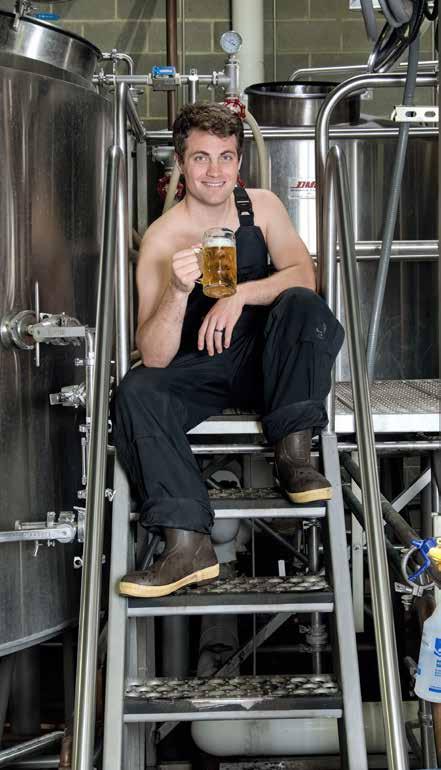
As for Richard, he has a PhD in mathematics, which he followed with post-doc work in Germany with his wife. After two years of that, he grew fed up with academia and reached out to his brother Jack, the head brewer at Ocelot. Jack, it should be said, may be best known for an IPA dubbed “Gorgeous and Alone,” one of his first recipes. They brew it “with a base of Pilsen malt and then just enough English pale malt to evoke this IPA’s big brother (Talking Backwards).” It’s “hopped with the holy trinity of Citra, Mosaic, and Simcoe for that classic bouquet of citrus, berry, and pine.”
Richard’s tastes run more toward the German lagers and one of his favorite styles is Maibock. “I really love lagers; I just love their purity. They’re challenging to make because any flaws in your brewing process really show up in a lager.” That said, they thrive on creativity and have brewed more than 300 different beers in eight years. “Seven of the beers on our menu right now have never been brewed before,” says Adrien, “Plus a seltzer which we’re playing around with now.”
Because Adrien previously worked for the National Center for Missing and Exploited Children, he has a soft spot for charity, but says he “doesn’t keep score” – just does what he can whenever he can, and enjoys every minute of it.
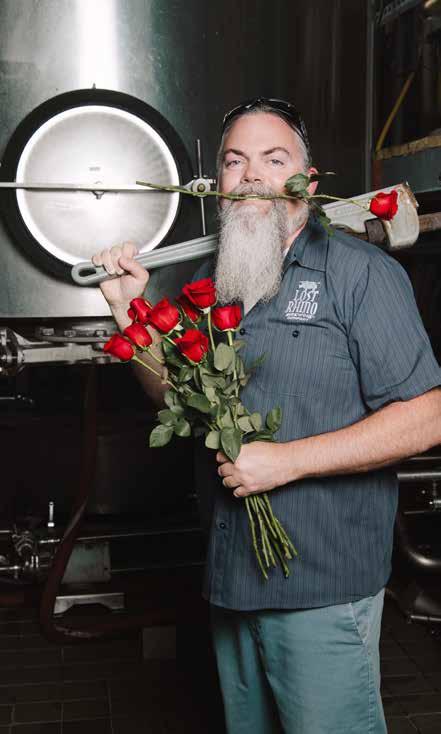
Chris Suarez of Loudoun County Brewers Association calls Matt Hagerman, owner of Lost Rhino, “the O.G. of Virginia Craft Brewing.” Matt did in fact open one of the first Virginia craft breweries after Old Dominion Brewing was purchased by AmBev and moved to Delaware in 2009. The loss of the brewery, which had been brewing craft beers locally since 1989, was felt deeply by Matt who had worked there. Long story short, he ended up buying Old Dominion’s 25-barrel brewhouse and opened the doors on Lost Rhino on June 20, 2011.
The name – and the California vibe – does in fact stem from the name. A “Rhino Chaser” is a surfing term for an adventurer in search of the perfect wave – now the name of one of the brewery’s Pilsners – and “Lost” of course derives from the missing ocean. Most of the beers now brewed there have an adventure theme, and all are artfully designed by Matt’s first hire, Logan Martin, a graphic artist out of VCU.
Matt learned to brew in California and says, “the vibe in general out there is very different from Northern Virginia. Here you have a lot of traffic, stress, and anxiety. What I wanted to do is kind of capture some of that California vibe and bring it back here, all the way to the music. Everything is very intentional, to make sure that anybody that’s either in a suit or in flip flops can come in here and have a good time.”
As for stress reduction, we last covered Matt when he was partnered with Canabreeze on a mild THC seltzer. When Virginia law renewed restrictions on THC in June of this year, the Pineapple Dream recipe was revised to include only full-spectrum CBD to meet the requirements. “It will still help you relax and it’s a solid product. It’s just a shame that Virginia is going backwards when all our neighboring states have legalized it.”
Pressed to name a favorite beer, he says, “They’re all kind of like my kids.” He is partial to the RhinO’fest Märzen Lager, billed as “an excellent companion to Autumn’s first chill with its full body, malty flavors and a clean, dry finish.” It’s repeatedly won gold at the Great Beer Festival and once from the World Beer Cup by the Brewer’s Association. The beer is also brewed to complement the brewery’s Rhino-fest in mid-September, a fun time of games food and challenges like the stein holding contest.
Trivia contests on Mondays and Thursdays also are an opportunity for patrons to bring in canned goods for the hungry. “We average about 100-150 pounds of food per week, which we load up in the car and drop
Ashburn, oldoxbrewery.com
off at Loudoun Hunger Relief. Thanksgiving is our big push, but we do it year-round.”
If you can’t make it to the brewery, you can also find New River Pale Ale, Rhino Chasers Pilsner, and Face Plant India Pale Ale and a few others at Costco, but we recommend the trip. As Matt says, “I think that any beer worth doing, you should do it right. We’ve done experimental beers, we’ve had our crazy beers and we’ve had our great beers but, we want to make sure that our customers enjoy it.” We say, take the road less traveled and “get ost.”
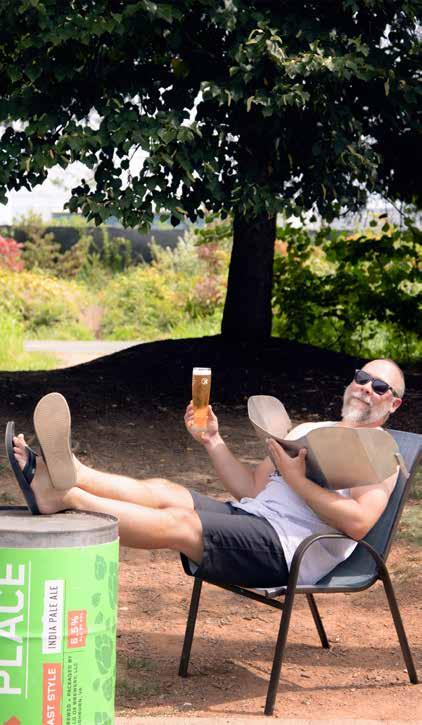
Chris Burns’ dad introduced him to home brewing a decade before he started the Old Ox Brewery. “From the moment I got there, I was hooked immediately because I thought the brewing process was so unique and that it really satisfied both halves of my brain. I could tell that we could be as artistic as we wanted to be and creative, but we can also be as analytical and science-minded too. I thought it was really unique in that you could be both intellectual and artistic with beer. It was love at first sight.”
After brewing awhile in Chris’ garage – “to the point that it started to look like an episode of Breaking Bad” – they got sick of giving the beer away to their friends and decided to see if they could make a commercial go of it. The brewery opened in 2014, taking over the place from a wholesale flower seller. In some respects, it resembles an old fire station, which makes the firefighters who come by for the brewery’s many benefits for the Ashburn Volunteer Fire & Rescue Department feel right at home.
Locals know it for the annual chili cookoffs, “Tales and Ales” storytelling events organized by Danielle Nadler to benefit local charities, comedy clubs, and too many musical performances to name. The “Trottin’ Oxen” running club uses the brewery’s proximity to the WO&D trail to make it their stomping grounds as well. “They meet every Tuesday evening and every Saturday morning here at the brewery and it is a ‘come as you are’ running club. Their motto is ‘Your pace our place.’ It’s an incredibly supportive group of local runners that are just out to have a great time, be physically fit and enjoy a beer.”
Chris says only, “It’s our goal is to support the community that supports us.” The brewery is named for Old Ox Road, one of the oldest in the county, originally built to connect the farmers in Loudoun
County with the markets in D.C. “We really identified with that because we consider ourselves a connection point within our community. Whether that means that people are coming to the tasting room to connect with their friends and family, or whether it’s us being able to connect with like-minded businesses like the bars and restaurants that we serve, or the food trucks that we work with, or the charitable organizations that were fortunate enough to serve –we really do believe that we can be this connection point within our community that allows us to leave it better than we found it.”
And, of course, they have a little fun along the way. Their “Bye Dan” brew commemorating the departure of Dan Snyder as owner of the Washington Commanders, is just one example. “We thought it was going to be fun and that people would respond to it but we had no idea how big a deal it was to people. I’d estimate we’ve sold close to 400 barrels of it or thousands of cases. And we’re still making it.”
Chris hosts the judging for the Virginia Craft Brewers Association where a record 129 brewers competed. “We enjoy it because we get to see all our brewing friends when they drop off their beer,” he said. Though he didn’t medal this year, he entered Black Ox, their Rye Porter, Hoppy Place, a West Coast style IPA, Hardway Lager, and Orange Wit, finished with orange peel and vanilla, all of which he enjoys. “I’m a very mood-based drinker. We like Porters when we’re having a nice steak or lagers when we’re just hanging out in the summer with our friends on the porch.” He doesn’t care for heavily fruited sours with lactose added for residual sweetness – “While popular, those are just not qualities I’m looking for in a beer,” he adds.
It remains a family operation with both Chris’ mom and dad actively engaged in the business. His mom, Mary Ann, books all the entertainment, which has been important for Old Ox being “off the beaten path... unless of course, you’re on a bicycle,” Chris quips. Their 30-barrel brew house does lend itself to distribution, so you can find their beers in local restaurants, independent shops and grocery chains across Northern Virginia, Washington, D.C., and parts of Maryland. There’s now a pilot brew house in Middleburg with a 100-gallon brew house where they can do a bit of experimentation. Look for a pina colada inspired beer flavored with coconut and pineapple – just no added sweetness, thank you.
It’s hard to even make it through the door at Loudoun Brewing Co.’s downtown Leesburg location without spotting multiple examples of the brewery’s philanthropy. Out front, Rusty Foster oversees the beer trailer refilling its taps of beer brewed especially for the Summer Concert Series at Tarara Winery: an American style IPA called Tie one On, a blonde ale with a tangerine twist called Fit to be Tied, and a boysenberry-peach seltzer called Ends in a Tie.
Inside, owner Phil Fust and associate Paul Flynn are hanging a facsimile check for nearly $32,000 from the Loudoun County Brewers Association to the American Federation of Suicide Prevention – proceeds from a special brewing collaboration called, You Are Not Alone. In other words, just your typical day.
This year was the first Phil entered the VCBA competition, and he came home with a bronze for Polished Foxx, a Belgian Ale named for his friend and collaborator, chef Erik Foxx. To celebrate the win, and LBC’s eighth year of operations, chef Erik will be serving food on the lawn between the brewery and Dodona manor, aka the George C. Marshall House, on October 29th. (Check the brewery’s Facebook page for details.) Over the years, brewer-owner Phil has designed more than 160 recipes. Because there are only eight taps, that means a constantly changing menu that cries out for a sampler and a soft pretzel.
His is a family owned and operated business that prides itself on creating a community-focused and family-friendly atmosphere – what friend Paul describes as “your neighborhood pub.” Phil just says, “We’re trying all the time to keep smiles on our faces and on the people who come here.” Because he owns one of the area’s smaller brew houses, that means non-stop room for creativity and improvement. Phil, who is particularly fond of Belgian ales, says, “They’re all very unique. You can make the same beer over and over again and each one of them will have a different characteristic.” Polished Foxx in particular, “was created to be the accompaniment to very fine food. We’ve served it several times with food that Erik has prepared and it’s always been a treat.”
Phil reveals that he “cooked a lot when I was younger” and “found out that beer and food have a whole lot of things in common: colors and textures and layers and depths of flavors. I like beer and had several friends who were making beer, so it seemed natural to go figure it out. And it’s fun.”
Of his other brewing collaborations, Phil says, “It’s a very social business. I don’t know the wine side of things that well, though I do know some of the winery owners. I can tell you the beer people are all very friendly and supportive – very connected. We hang out with one another, and we actually like each other. That’s a good thing. So our collaborations are just part of that friendship.”
Concern for the people of Maui affected by disastrous wildfires may result in yet another special brew though that’s still in the conversation stage. “Once it’s in the works, a project like that takes about four weeks to happen,” he explains.
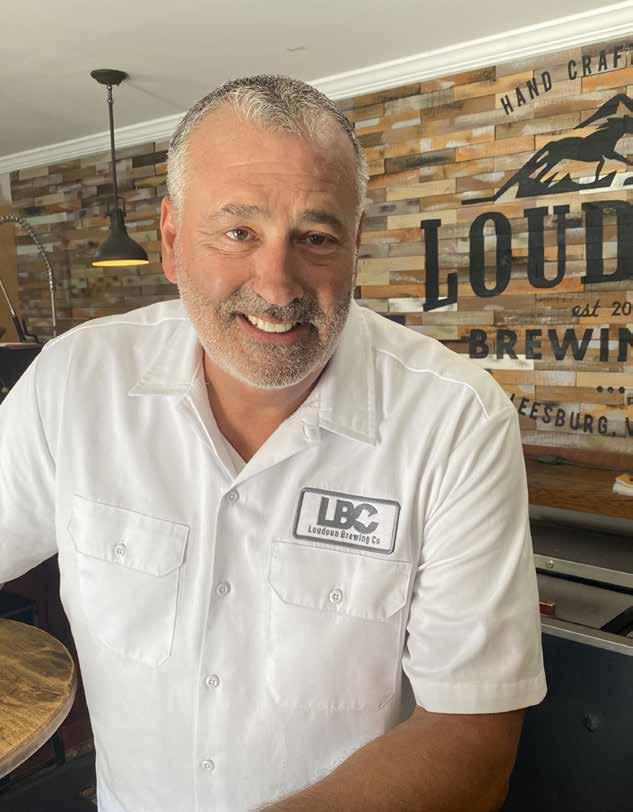
When it does happen, they meet very early in the morning and the brew usually starts before sunrise – “so you can get out before the temperatures in the brew house reach 90 degrees,” he explains. “We’ll have meetings ahead of time so everyone can have creative input as to what the beer will be. Anyone who wants to participate in the project can then sell the beer for charity.”
Phil was on the clock and had to get back to brewing, but says the beer he was brewing right at that moment – Mosaic Sunshine, an American IPA – may be his favorite of all time. Until the next batch, that is.
Bill Haase started brewing 17 years ago when a friend asked him to “split a batch” of home brew he was making at a rentable brewing establishment – something we thought sounded like fun though they’re largely defunct. “That’s where I caught the bug.”
Once he dived into the science of brewing and the microbiology of yeast, he became proficient and won an American Home Brewing competition for his Märzen. “That was the validation I was looking for.” When he decided to can the cubicle and open his own place, he was working as a water engineer, another great bit of background for a brewer. “We send all the water through a granulated activated carbon filter to strip out the chlorine, and then send it through a reverse osmosis system to pull out the orthophosphate that the town puts in to help protect copper pipe, and the fluoride. Then of course we pull all the minerals out. We go from town water that is about 270 parts per million of dissolved solids to about 10 parts per million.”
That gives Bill the flexibility to rebuild water profiles for a range of different beers from Pilsners and Helles to light lagers and darker beers.
He and his wife bought the Leesburg venue in 2017 after a fire razed the upstairs. He wanted to be downtown because it’s where he and his wife live and attend church. Because they had traveled in Germany in 2010 they rebuilt the place from the studs up to evoke a German style beer hall complete with large color photos of Germany and Austria. Given their German background, Bill is naturally inclined toward traditional, “true-to-style” German lager and European ales.
Bill’s VCBG medal this year honored his Morning Fog Rauchbier in the “Smoke” category. “Rauchbier smoked beer comes from the town of Bamberg, Germany,” he explains. “It’s a smoked Märzen with a nice amber color. The smokiness comes from the Birch they use to smoke the malt that we purchase. It goes really well with smoked meats and all food, which clears your palate,” he adds. “It’s also good for marinating meats in.”
He has medaled nearly every year at VCBG since his opening, taking best in show in 2020, and last year won a bronze for his Full Quiver Märzen at the World Beer Cup, which draws entries from around the world. He’s always particularly pleased when he does well in competition with German brewers, whose craft he admires.
Black Hoof celebrates Oktoberfest October 7 from 3-10 p.m. with food, music and of course beer, and they love dogs! Bill also is looking forward to opening his second location in Hamilton next Spring.
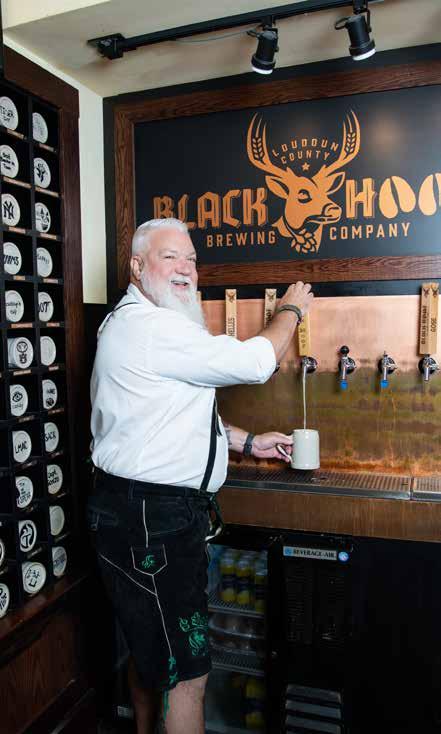
Tolga Baki started as a home brewer, in his case nearly 30 years ago. “I loved traveling through Europe at the time and loved Belgian style beers and some of the German beers that you couldn’t find here. I needed a hobby so I started getting into it at home. My first batch was a pale ale, because I figured that’d be easy to make, but back then, ingredients weren’t as easy to find as they are now. It was good. My second batch was a porter that was drinkable. My third batch was terrible and I gave it up for a couple of months.” As good stories go, of course, he returned to the craft and eventually made it his life’s work.
Along the way, he became one of the founders of Home Brewers of Western Loudoun (a private Facebook group at facebook.com/groups/HOWLBrew), which he says is “a great bunch of people” who taught him a lot. Then, back in 2012 he said, “This craft beer thing is getting kind of large, so let’s just be a part of it!” Of course, not everyone with the gumption has a family that owns a nearby winery. But even that was no free ticket. It wasn’t until two years later that the Virginia statehouse passed its Farm Brewery license for breweries that manufacture no more than 15,000 barrels of beer per calendar year, are located on a farm in Virginia and use agricultural products grown on the farm to make their beer.
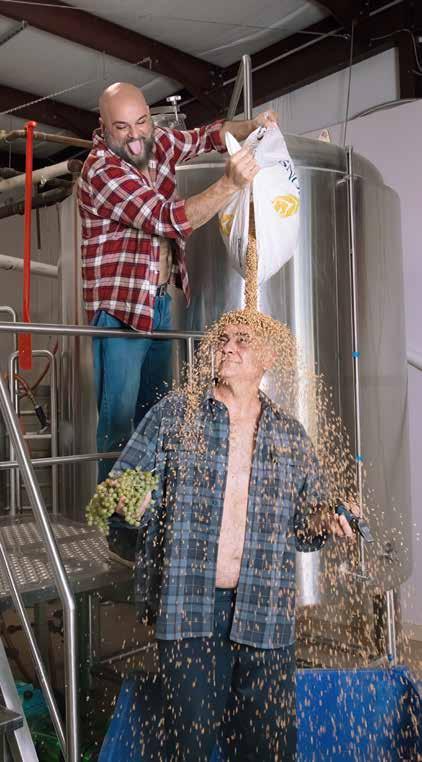
Undeterred, Tolga decided to open a brewpub in Purcellville called Belly Love. Two weeks after signing the lease, the farm brew law passed. Tolga is sanguine about the timing of his circuitous journey to being able to brew from Hillsborough Vineyards and Brewery, saying, “It turned out to be a good thing because I got my feet wet professionally in the brewing scene. I learned how to brew under the pressure of time constraints and find ingredients on a commercial scale.” It took another four years, until October 2018, to reproduce his operation at Hillsborough.
In the meantime, Hillsborough continued operating as an estate vineyard, and celebrates its 20th anniversary this month. It’s a family run business where his brother makes the wine, his sister-in-law manages the tasting room and marketing for both businesses, his mom is the resident artist and his son and daughter have joined the business. His dad is supposed to be retired, but manages to stay involved; a brick oven is his latest contribution. “We’re now a multi-generational, family-owned winery and brewery,” says Tolga. “I think that’s huge.”
Tolga brings his own talents and background to the business – leveraging his background in Web app development, he appears to be the first brewer to have crafted an IPA entirely in collaboration with OpenAi’s ChatGPT, and even used Jasper.AI to create the name, the design for the label and the descriptive marketing language for the can.
Purcellville, old690.com
“I asked it to give me a hazy IPA recipe that’s never been done before,” he explains. “It used a malt that I’d never played with that I wouldn’t typically put in an IPA. All the hops were common except for one whch isn’t typically used in an IPA either.” Tolga pushed back, saying, “I think that’s going to be too bitter for an IPA,” and the bot apologized. Resulting from the collaboration was Solar Flare, a bright, crisp, citrusy beer that – after a few tweaks to eliminate what some tasters saw as bitterness – Tolga plans to make a regular part of his repertoire. What’s served now is technically Solar Flare 2.0, a beer that benefits from Tolga’s own taste and expertise.
Will AI replace the creativity and craft of brewers?
“Well, it won’t replace me because I own the place, and it can’t exactly brew the beer, but it could replace my artist and my marketing person,” Tolga said.
If you’re heading to the Vineyard and Brewery, you’ll find Hillsbrau, a German-style Pilsner, which is probably the most popular, Blonde Moment, a Belgian Blonde Ale, Stone Cold Fox, an American Hazy IPA, and Ol Bessie, an American Brown Ale. At Belly Love: Narcissist, a Helles Lager; 50 Shades of Gold Belgian Strong Golden Ale; My Bitter X, an American IPA; Shut the Fook Up, Pale Ale;
Wicked Good IPA; and Eye of Jupiter an Oatmeal Stout, along with some seasonal varietals. “I like a nice, balanced, crisp beer that you can actually enjoy.”
To mix things up, and stay true to the agricultural edict in the Farm Brew license, he has also incorporated grapes into a couple of brews. “I have one called BiPolar which is a dark porter with Tannat grapes, and one called Rusty Silo which uses our Petit Manseng. They evolve every year, which is a challenge. I mean if I could put a vintage on beer, I would do that, right? It’s something that is fun to play with because it always comes out differently.”
Kerem, the younger of the two brothers, is the winemaker, and there’s always good-natured competition over whose production will overtake the other’s in sales. “The wine started out in the lead, obviously, but we’re catching up and soon we’ll blow them away,” Tolga laughs.
Jesse Powell originally came into the family business when the Powell’s were part owners of Harpers Ferry Brewing. Along the way, he also ran a craft brew store in downtown Leesburg, which he exited soon after Total Wine & Beer opened. He now serves as operations
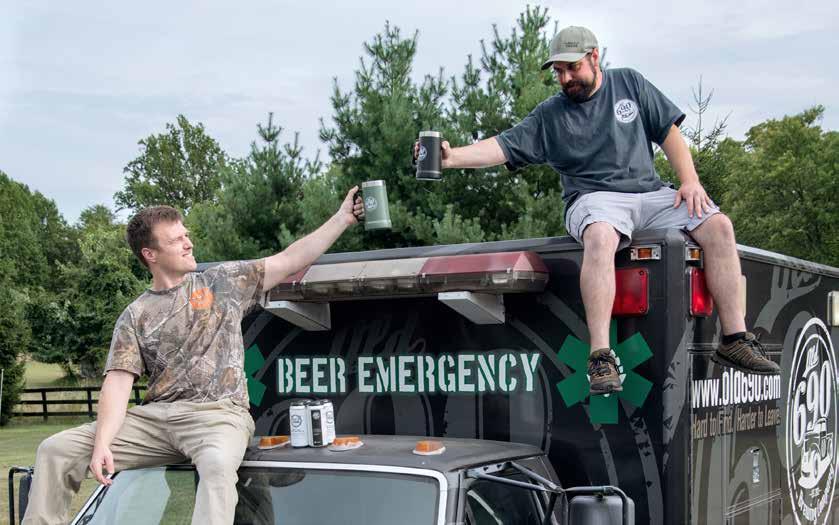
Hillsboro, harvestgap.com
Sterling,
manager at Old 690 where he orders all the ingredients, comes up with the flavor profiles of the beer they’re looking to brew, works with their beer distributor and helps out with packaging.
Owning his own beer store did give him a good feel for what local customers wanted, and his background in environmental economics doesn’t hurt either.
His parents purchased the property in 1996 and started the brewery in 2014. They’ll celebrate their 10th anniversary next August. A high point was when the Capitals brought the Stanley Cup to the brewery in 2018. “We told no one, but there were cars parked all across the yard and the driveway. It’s the most people I’ve ever seen here,” he said. His current favorite is their Lawn Mower Lager so named because it’s a great beer to drink while mowing the lawn.
Head brewer Ryan Yerdon has been brewing for 20 years but has been at Old 690 for four. “There’s not a style of beer I haven’t made but here we stick to the classics. We do one or two fruited beers a year, a stout and a couple of New England IPAs, but the traditional brews do best with our clientele.” Of the twelve beers on tap, usually half are seasonal and the rest, like the signature Blonde Ale stay year-round. It’s a Fiero, an Italian Pilsner, is another sleeper that’s quite popular.
The first and third Friday of every month is “Open Mic,’ there’s live music on the second and fourth Fridays and every Saturday. And, for every “Beer Emergency,” there’s always the ambulance. (It was purchased by Jesse’s dad who retired from the local fire department and bought it after it was de-commissioned, but makes for a great prop.)
In military jargon, a “Devil Dog” is a hard-core marine, but the title could easily apply to Mike Hastings, the unassuming stoic who brewed the beer by the same name for Harvest Gap Brewery. Before the maker of this year’s award-winning Devil Dog Helles Lager took off for his heart bypass surgery, Mike filled all his tanks, got his cooler cold and everything else squared away while he planned a two-month absence for surgery and cardiac rehab. “I didn’t know how long it would be before I could start hauling kegs around again,” he explains.
It’s just what you do when you’re a solo brewer – a guy who often works from dawn until dusk seven days a week: when not brewing, cleaning. When not cleaning, purchasing, prepping and storing ingredients.
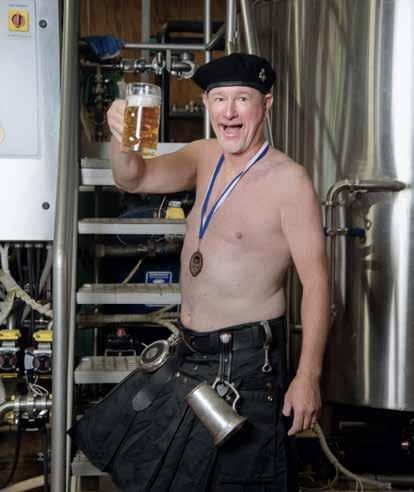
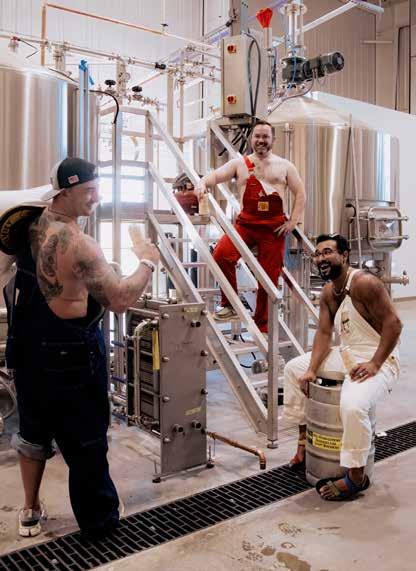
When doing none of those things, well, maybe enjoying a hard-earned pint of the Pale European Lager that he helped originate, first at Lost Rhino, and then for Harvest Gap.
As he describes it, “It’s a very light, crisp, refreshing lager that has kind of a biscuity backbone. It’s not like a pilsner that’s overly dry, but has a bit more body to it. And it finishes real nice and soft.” He adds, “There are lots of IPAs out there, lots of hazy IPAs and stouts and so forth. But that style of beer, the Helles or any light lager is extremely hard to brew because any mistake by the brewer or in raw materials that are not of the best quality will come right through in the beer. So, it really shows the brewer’s craft and integrity to brew that style of beer and have it be an award winner. I like that. That’s my style of brewing: very technical, very solid, very traditional.”
Last year the beer took gold and best of show; this year merely a bronze, but Mike says “Consistency is what counts. Consistency, cleanliness, attention to detail and organization will get you very, very far in this business.” Mike helped Harvest Gap open three years ago as a consultant, just prior to the pandemic. The family owners had previously operated the Gap as a produce market, but decided to transform the greenhouse into a taproom and brewing facility, and have never looked back.
He enjoys the job, despite the long hours and obvious stresses adding that he’s been a brewer for 30 years, all over the country, once owning his own brewery in California that went bust in the Recession of 2008. He’s been in Virginia for six years, three of those at Lost Rhino. Harvest Gap’s co-owner Mike Virts enjoyed European pilsners when he was in the military in Germany, so Mike Hastings made the switch westward to join him. The Virts family has been in Loudoun County for some 300 years, and raises cattle in addition to operating the brewery.
This month visitors can enjoy the Brewery’s corn maze, part of the Fall Festival which began in September and will continue until November.
October 14 will mark the brewery’s third year anniversary, an event which calls for a special brewing of a salted caramel vanilla Porter, rich but not too sweet, in Mike’s words.
“Harvest gap is for everybody,” he adds, “young and old, dogs, every demographic in Western Loudoun. Most of them enjoy lighter beers; Stud Light is our number one seller,” he said. His favorite beer? “The one in my hand is what I like to say.”
Army veteran Allen O. Cage, Jr. started Honor Brewing in Chantilly using a contract brewery in Pennsylvania. The Chantilly tap room was designed with military families in mind. The bar top there is made from wood from a 76-year-old tree found at Fort Belvoir. Photos, patches, and other mementos belonging to military veterans and fallen soldiers, line the tasting room’s Wall of Honor. Each of the 16 tap handles displays a military dog tag featuring soldiers who made the ultimate sacrifice. Since 2014 the company has chosen a charity every month to receive 25% of sales from its best-selling Classic Lager. That plus some other donations totals more than $51,000 given to veterans and first-responder charities (see honorbrewing.com/ways-we-give .)
Allen’s son Ryan, who founded a successful crossfit company PR Star Fitness ( prstarfitness.com) recently became CEO of the company and plans to take it to the next level. We visited the massive, 35,000 square ft. brewery, restaurant and event center in Sterling at 42604 Trade West Drive that should open October 2nd, or about the time you’re reading this article. Next door, there will be another 14,000 square ft. CrossFit gym. Across the brewery’s open space 500+ townhouses and condos are under construction. Across the street Solace Brewing Co.
Ryan said he spoke with Drew Wiles, aka “Wiley,” and Jon Humerick, co-founders of Solace when they broke ground in 2019 and says, “We have a great relationship. We both want to work together to provide our area with a great destination for recreation.”
The American traditional style restaurant alone should be a draw because Honor has hired John Dylan Snyder - Michelin Chef. When he applied, Ryan admits he told him he was probably overqualified for the job, but John said he was “done with the mentality of that type of restaurant and wanted to have some fun.”
Asked to comment on the sheer scale of the project, Chris allows, “There’s a bit of a Field of Dreams mindset to it, you know, ‘If you build it they will come.’ But for us, it’s about getting out there in the Chamber and the Loudoun County Brewers Association and the community and putting in the hustle. Right now I’m all about planting seeds and 2024 is when you should really see our growth.”
Chris’ current favorite beers are the Classic Lager, Utah Get me Two and Sonic Boom, both Double IPA’s and a fruited wheat series Dress Blues and Lady Liberty. For the opening, they’ll have a new IPA called Freedom.












numbers go down. “But teenagers aren’t getting less hungry,” Kirslyn says. “They’re getting more hungry as they grow.”
Getting kids FuelED means first breaking down the stigma of food insecurity in Loudoun.
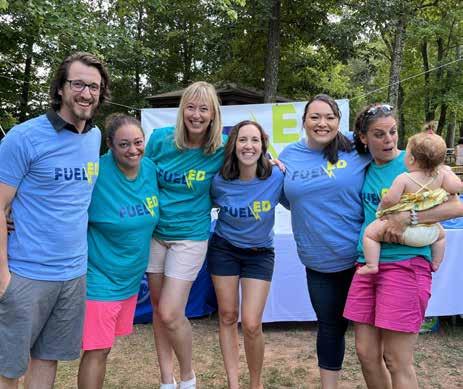
The more contemporary name change and modern logo update for Loudoun Education Foundation’s (LEF) Backpack Coalition is designed to resonate with the status-conscious middle school and high school students it serves.
“Teenagers told us food insecurity shouldn’t be a secret,” says Kirslyn Schell-Smith, the program coordinator for FuelED. “They said people need to talk about it, not just secretly hide it in someone’s locker or book bag. Teenagers are the ones who notoriously don’t take the bags.”
FuelED provides food to more than 1,000 students in Loudoun County each week with the goal of aiding their family through the weekend when school lunches aren’t available. Though the distribution days vary by school district, Kirslyn says the elementary school students are typically “super excited” to receive their bags; it’s in middle school and high school where the organization starts to see the bag
Kirslyn explains that with so many different organizations using the word “backpack” in their name, people were getting confused about LEF’s food security mission. “We never distributed school supplies, and so a lot of people got that confused and thought we did school supplies,” Kirslyn says. The “ED” at the end of FuelED’s rebranding places the emphasis on education. Loudoun Education Foundation is an independent nonprofit that supports Loudoun County Public Schools. LEF also stocks food pantries in schools where they offer more culturally appropriate items, as well as hygiene supplies, household products, and snacks where families can choose the items they want. FuelED pantries are 90 percent supported by donations and the meal bags are 95 percent supported by “weight purchases” from the Blue Ridge Area Food Bank.
FuelED’s product sourcing and swift response to critical needs also creates strong community connections. “We communicate directly with the family liaisons who are employed by the schools who help connect families to different resources and support systems,” Kirslyn says. If a school doesn’t have a liaison, then it’s usually a counselor or social worker that reaches out to the families and returns to FuelED with specific needs. FuelED then connects volunteers, local and national businesses, donors, and community partners and organizers to provide for students and families through meal bags and in-school pantries.
“It gives these families a chance to find and learn about resources,” Kirslyn says. “A lot of times, the liaison will learn, ‘Oh hey they need rental assistance too; let me connect them to this person,’ so it’s more than just, ‘here’s some food,’
they’re actually making connections, which is especially hard with work schedules and school schedules and childcare and availability. Teachers are super busy, so it just gives them one more person to connect with.”
The weekly meal bags are put together by volunteers and distributed and delivered by Amazon Web Services, as well as a local logistics partner. Every Wednesday, those bags are given to the schools, the liaisons, or other designated school staff.
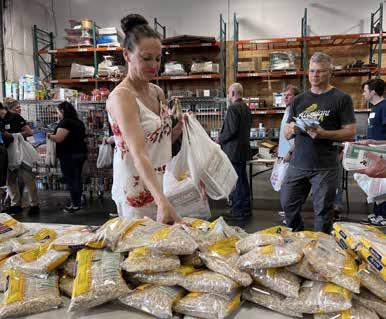
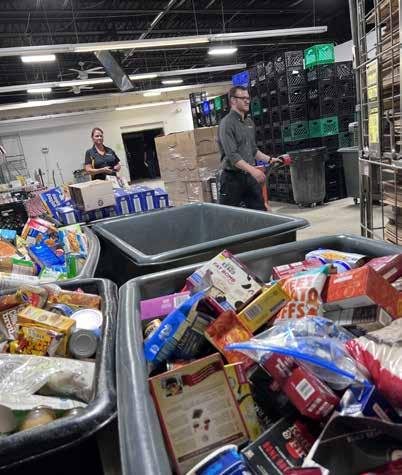
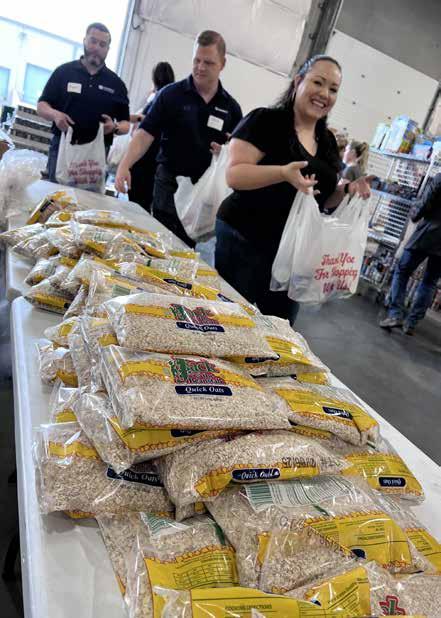
“Because of the volume of items that we distribute a week in our meal bags, that’s the easiest, most efficient, most cost-effective way to do it, because we’re packing about 1,000 bags a week during the school year,” Kirslyn says. “Food insecurity is everywhere in Loudon,” Kirslyn says, “especially because there’s such a gap between those who qualify for any governmental assistance or SNAP benefits. A lot of people make too much money for that, but don’t make enough to be able to be food secure. So, we’re really focused on filling that gap.”
To learn more about FuelED, and how you can support the organization through volunteer pack nights, delivery dates, snack and hygiene drives, or generous donations, visit LoudounEducationFoundation.org/fueled .
Promises to bestow you with game-changing insights for constructing a dynamic action blueprint, fuelling your leadership journey with an invigorated passion and dedication!

Join us at this two day (9-12) event for you to INVEST in your leadership and personal growth with speakers John C. Maxwell, Kendra Scott, Marcus Buckingham, Ryan Leak and Fireside chat with Tina Johnson hosted by Deborah Leben of DL Coaching.



10% off Lunch and Learn training if mention City Lifestyle magazine. www.eventbrite.com/myevent?eid=688128178907








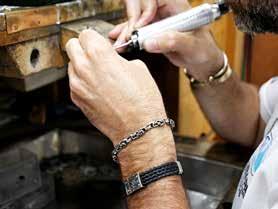


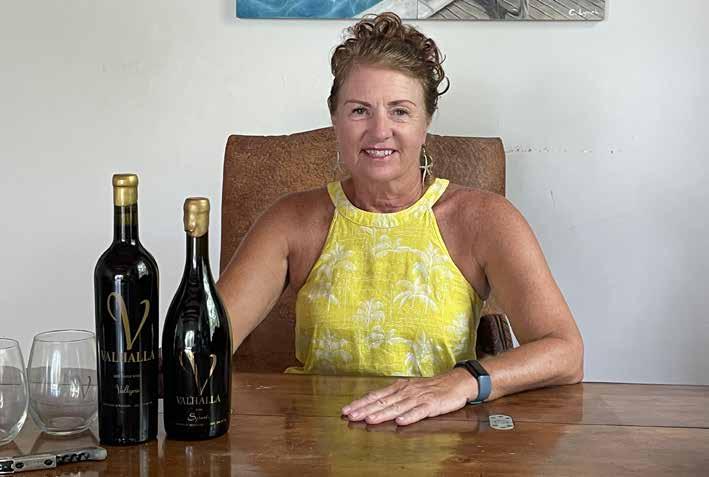 ARTICLE BY MELINDA GIPSON | PHOTOGRAPHY BY DEBRA
ARTICLE BY MELINDA GIPSON | PHOTOGRAPHY BY DEBRA
When Debra Vascik and her husband, neurosurgeon Dr. James Vascik, decided to found a Virginia winery nearly thirty years ago in Roanoke, they tapped their love of the great French Burgundies and of opera. Together, they enjoyed at least three full performances of the Wagner Ring Cycle, four operas that together total 15 hours of music – an unusually heroic accomplishment, even for opera lovers.
Inspired by the heroes of Norse mythology, they called their mountaintop winery overlooking Roanoke “Valhalla” after the eternal feasting hall of the god Odin. Their signature Bordeaux blend was called Valkyrie, named for the mythic females who spirit fallen warriors to their reward. Their Chardonnay became Rheingold, and their Cab Franc / Merlot blend Götterdämmerung.
But it was her simply named and lovingly produced 1998 Syrah that earned Debra undisputed first place among
Virginia winemakers. It was her very first estate vintage and, in 2000, it put Valhalla’s name on the Governor’s Cup. Yes, that’s right. Debra Vascik and not Cana Vineyards’ Melanie Natoli, as we reported from last year’s Governor’s Cup celebration (https://bit.ly/VaWomenWinemakers), was Virginia’s FIRST First Lady of wine.
If we were inclined to ignore this, we’d have ample excuse. The Virginia Winemaker’s Association press release in March of 2022 itself identified Melanie as the first female winner in the Cup’s 40-year history. The release was later quietly edited in June to name Debra as the first female winner, and to acclaim Melanie as the first in more than 20 years – a still formidable accomplishment. We say quietly because it took a call from Debra to correct the record, no formal correction was issued, and no one from the Association has ever called Debra back to apologize for the error.
The hard truth is, we should have known better. During Valhalla’s lushly productive and internationally heralded early 2000’s, this writer and her son poured for Valhalla, because it was then unarguably our favorite Virginia wine. Back then, in the heyday of Virginia wine festivals, oenophiles volunteered in return for bottles of wine. We did so happily and were made to feel part of the Valhalla family – always treated to a fine dinner with Jim to cap a festival weekend.
Should the Association also have known? There is a different head of the association and a new process for selecting the many more numerous Virginia vintages that are now produced. Back then, the winemakers themselves selected the winners from a blind tasting. Debra’s name wasn’t on the cup – only that of Valhalla. But plenty of folks should have known, and it’s incumbent on everyone to care about Debra’s landmark achievement. Women winemakers, more than their male counterparts, stand on the shoulders of a giant.
In 1994, what became the Valhalla estate was a peach orchard. Peaches and grapes require very similar growing conditions and the soil was decomposed granite, common to the Rhone Valley of France. They bought the place with the idea of putting in a few vines and making their own home brew, and “things went way over the top,” she recalls.
To get them started, both Paul and Robert Mondavi sent them wine barrels. The Antinori family and “a lot of the big wine names were very helpful in getting us started on what we wanted to do which was something totally different” than other local winemakers of the time, she recalls. Initially, Debra wanted to produce only red wines, but was persuaded to plant whites as well, producing a crisp citrus, barrel fermented Viognier and minerally, smooth Chardonnay, blended together as Row Ten – “but our passion was in the reds.”
“We didn’t release our reds until they were four or five years old. We held them all to age in barrel for a minimum of four years, and then in bottle for a year. We just felt the wines needed it and you know bottling was very disruptive to aromatics. So, our wines were older than standard of the Virginia industry.”
They were the first to produce a Spanish varietal called Alacante Bouschet – a great blender “because it added a lot of body and color. But it also made an incredible dessert wine, which is probably where we used it most.”
As for the winning Syrah, “1998 was our first estate vintage where the wine was made at our facility by me,” Debra says. “The vines were young. Syrah vines are incredibly intense and bold and dynamic when they’re very, very young and very, very old. If you think of
France, they have very, very old vines, and they’re getting tremendous fruit, and in Virginia, very, very young vines.” 1998 was the second year they’d harvested their young vines and it was a very good growing year. “We got the brix (a measurement of sugar in liquid), the ripeness, the intensity, the color, the flavor – I mean, everything just fell together with that vintage when my vines were young and wild and crazy.”
Because she loved the French style of Syrah, she would always pull about 20% of the juice off 24 hours after the crush to increase the intensity of the wine’s flavor. “I remember the dark, pruney fruit and the amazing raisin character and the French oak barrel. It was just a tremendous wine from the start to the finish; it had a forward palate and a mid-palate and at least a minute finish to it. A lot of wines that are made in Virginia tend to be lacking body; they’re somewhat thin. And I just remember you could almost chew it, it was so robust.”
Much as today, all the wines submitted for the Governor’s Cup were passed blind through varietal panels, rated, then ranked for the top 12 wines in the Governor’s case. In 2000, as was the case with Melanie, Debra had two wines in the Governor’s Case – her Syrah and Götterdämmerung. Well over 200 wineries existed in the Commonwealth back then, though not all submitted.
So, just ten years into an award tradition, “‘Maybe it wasn’t such a big deal to have a woman winemaker?’ we asked. ‘Boy, do you have that story wrong,’” Debra laughed.
“Winemaking was a boys club,” she recalls. Women winemakers then included just herself and one other in Middleburg at Swedenburg Estate Winery, which became Greenhill Winery in 2013. “We had to really work hard to be respected,” she remembers. “There were some people that were very supportive and very friendly to women in the industry” – Bob Bergen at Chateau Morrissette, Shepherd Rouse at Rockridge, Dennis Horton from Horton Vineyards and Luca Paschina from Barboursville “All were incredible, and absolutely wonderful to me, very helpful and kind and respectful... but the majority were not. They were not pleased when I won the Governor’s Cup. They didn’t feel that it was appropriate, and they did not have a lot of really nice things to say.”
Change came slowly but inexorably from that point, she says. “Women had to work twice as hard. They had to be twice as good. But once I won the Governor’s Cup, I finally garnered a little bit of respect as a person in the industry not, as I was called, a ‘bored housewife’ which was never true. I worked 8-10 hours as a physical
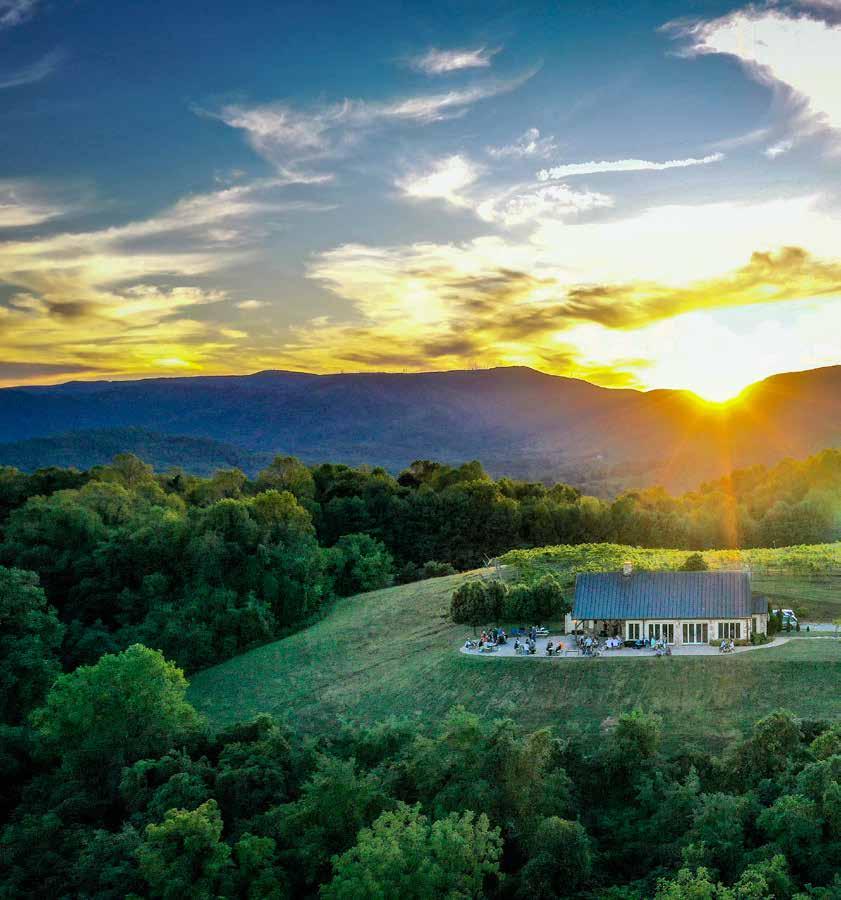
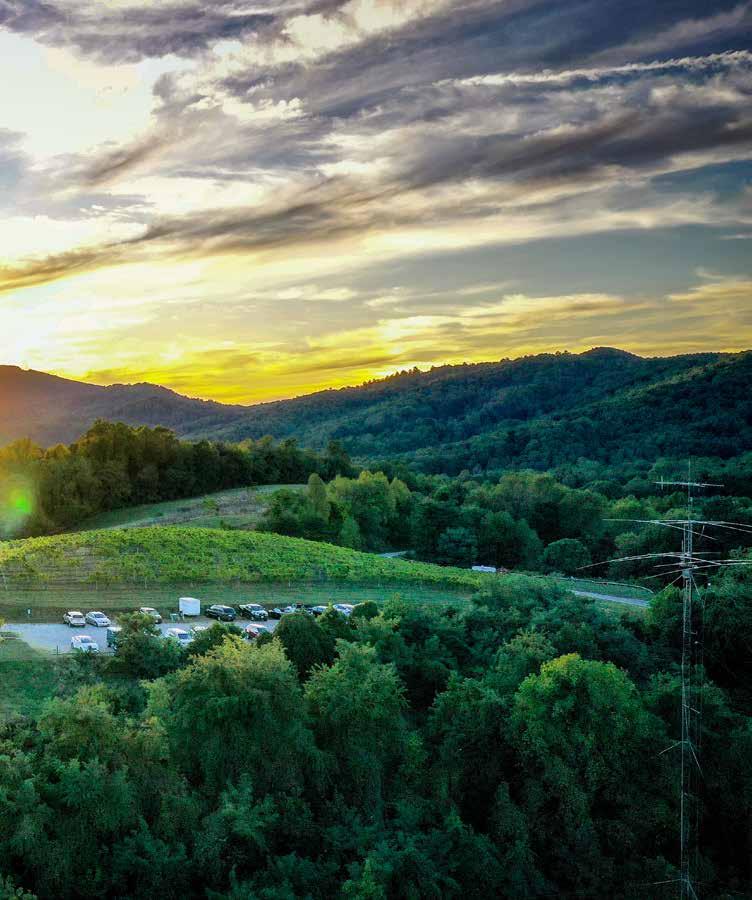
“We wanted to be different. We wanted to make a better Virginia wine and we succeeded. We raised the bar.”
—Debra Vascik
therapist then another 8-10 hours running a vineyard and making wine and raised two kids doing it.”
Which is why it stung when people forgot. Just a couple of months prior to the 2022 awards, Debra lost her husband Jim to a heart attack. “Jim loved wine. He loved food and wine, and he loved to grow the grapes. He didn’t want any part of anything else other than growing the grapes. I did all the winemaking and I managed the business but that was his relaxation from neurosurgery, to go out into the vineyard and prune a few vines or walk and check things and set up a spray schedule. That’s what gave him peace after a really hard day in the operating room.”
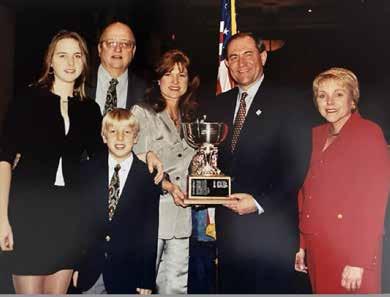
She’s now 68, so after 25 vintages, she’s taking life a little easier. By October, she’ll be able to enjoy her second grandchild. The 200-acre winery had 21 acres under vine at its peak, but now only three. They’re still producing though she has likely done her last major bottling. During COVID, she says it became extremely difficult to find anyone who would tend the vines run the tractor, even with hundreds of agriculture-immersed undergrads at her doorstep.
On that note, there are 2500 cases of exceptional wines that remain to be enjoyed, dating back to the early to mid2000’s, including some truly exceptional Valkyrie. The Vasciks always maintained that their perfection-driven winemaking lent itself to the longevity of their reds.
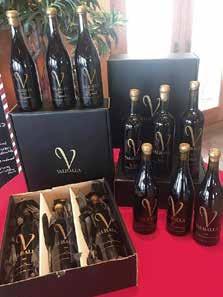
A great treat of those early wine festivals was a “library tasting” Jim presided over himself. But Debra maintains that longevity is just one side benefit of her craftsmanship. “We had conditions that allowed our grapes to ripen fully. To get the brix level we wanted we focused on the maturity of the seed and skin tannins and maintained the acid levels that add to longevity. We always hand-harvested and we never brought in a bad cluster. If I didn’t like the fruit, I didn’t make wine out of it because you cannot make a good wine out of bad fruit. That’s why neither of us could quit our day jobs!”
“We wanted to be different,” she adds. “We wanted to make a better Virginia wine and we succeeded. We raised the bar.”
Debra does hope to retire by the time she’s 70, but allows that her boundless energy, intelligence and hard-earned repository of knowledge about growing and producing Virginia wine could still be of use to the next generation of winemakers. First, she’d like to see all her wines go to “good homes” of those who appreciate perfection, and she’d love for the winery to be sold to someone who could continue the tradition.
To be one of those lucky homes, you’ll have to go there. The winery is open weekends until the weekend before Christmas, but check the website to be sure: valhallawines.com.

Healthy, beautiful smiles start at Ashburn Children’s Dentistry! As parents, we want the best for our children at every stage of development, and for many families the journey to optimal dental and whole-body health begins at Ashburn Children’s Dentistry.

Preventative & Comprehensive Care
Cosmetic & Restorative // Child Growth & Development


703-997-7789
www.kidzsmile.com

44025 Pipeline Plaza Ashburn, Virginia
Dr. Lynda & Dr. Krystle




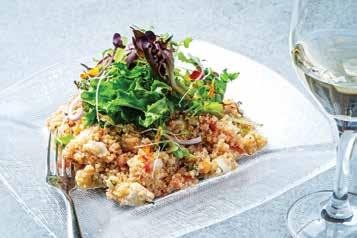
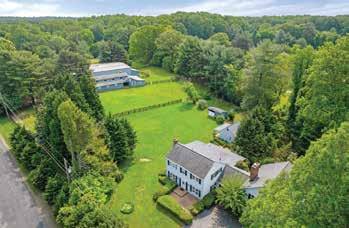





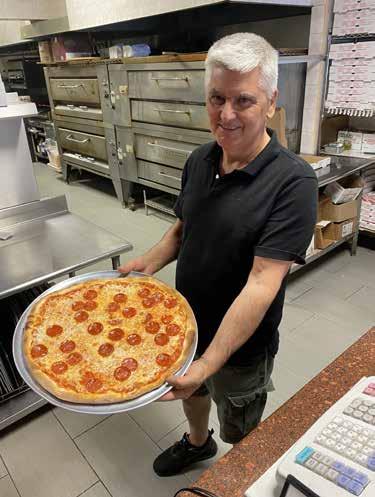
Vertosoft employees are as proud of the fact that their company was voted Washington Business Journal’s 2021 and 2022 “Best Places to Work” among small companies as that the Leesburg-based technology solutions company made the Forbes 5,000 list of fastest growing private companies for the second year in a row.
It’s clear the team embraces a culture of excellence in everything they do... even lunch.
Just by lurking on the Northern Virginia Foodies Facebook group — a GREAT source of local food recommendations — we learned that Dean Jackson and his colleagues had a friendly pizza taste-off going. Dean, a faithful contributor to the group, also has four kids, so he appreciates both value and quality in his pizza. Any professions of expertise aside, the ratings by the foursome who vetted eight local pizzas, tasting bracket winners at least twice, were remarkably similar. A good pizza, say Dean, Mary Dawson, Andrew Hinebaugh and Pej Keshavarz, excels on all four levels: cheese, crust, sauce and value. Since places like Pupatella, a relative newcomer to Loudoun though it’s huge in Reston, win raves based primarily on the exotic nature of their toppings, the jury decided to level the playing field and rate only “cheese pizzas.” (Even that designation gets sticky, but we digress....)
Because of value, two of the more surprising entrants were Wegman’s and Costco, the latter of which Dean maintains is arguably one of the largest pizza chains in the country by distribution. Their “quick, grab and go” offering is a great value at just $10 for a large pizza, and was tasty enough to edge out Fireworks, but ultimately fell short of Giovanni’s New York Pizza.
The lineup followed an East-West / North-South bracket challenge. To the East: Pupatella bested Wegmans; to the North Solo trounced Rocco’s NY Pizza and Subs. First round West’s winner was Costco over Fireworks, and South’s Giovanni’s won over La Villa Roma. That set up a duel between Pupatella and Solo, which Solo won, and Giovanni’s beat Costco by 10 points.
ARTICLEThe fun of having Solo face off with Giovanni’s is of course that Solo’s owner Said Mehenni, split from Giovanni’s in 2017 after many years. “He was none too happy about it at the time,” allows Said, speaking of Giovanni’s owner Ciro Schiano di Cola. As for Ciro, he says the family-owned business has called Leesburg its home since 1982, and thrives by the quality of his ingredients. Ironically, BOTH Solo and Giovanni’s New York Pizza pizza owners say their favorite pizza is the Margherita pizza! We can only attest that, had these two pitted their extraordinary sauce, fresh basil and mozzarella against each other, it could have been a different story.
VERTOSOFT EMPLOYEES ARE AS PROUD OF THE FACT THAT THEIR COMPANY WAS VOTED WASHINGTON BUSINESS JOURNAL’S 2021 AND 2022 “BEST PLACES TO WORK”
As it was, Giovanni’s edged out Solo by just one point. Crispier crust or a tad more sauce on either pie could have swung the vote, all agreed: “It was a buzzer beater,” said Pej.
So, why’d we train our spotlight on just one local business lunchroom when we’re just asking to be shouted down by other fans of other stellar shops not included in the Vertosoft taste-off? Well, first, there’s the relatively scientific approach with which the Vertosoft team – arguably skilled in weighing features and benefits in competing software solutions for government customers – went about their task. We liked their enthusiasm and the seriousness with which they rose to the challenge.
More importantly, if more local businesses weighed in with their own competitions, we’d all continue to be tantalized by an ever-increasing variety of great local pizza.
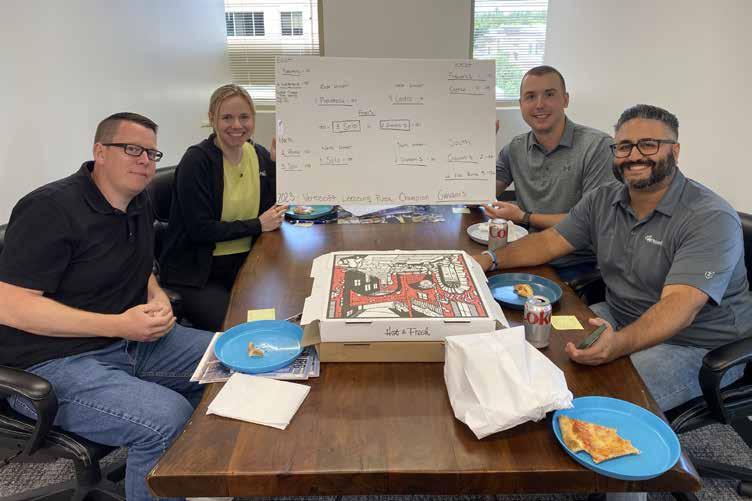
And besides – what’s better with beer?
 LEFT: Ciro Schiano di Cola Displays a Fresh from the Oven Pepperoni Pizza
TOP: Vertosoft Pizza Team Dean Jackson, Mary Dawson, Andrew Hinebaugh and Pej Keshavarz
RIGHT: Said Mehenni Displays His Extraordinary Margherita Pizza
LEFT: Ciro Schiano di Cola Displays a Fresh from the Oven Pepperoni Pizza
TOP: Vertosoft Pizza Team Dean Jackson, Mary Dawson, Andrew Hinebaugh and Pej Keshavarz
RIGHT: Said Mehenni Displays His Extraordinary Margherita Pizza




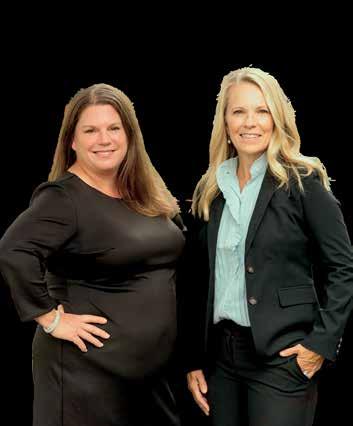







Balance hormones naturally, lose 15-21 lbs. in 30 days,* and break free from:

9 Mood swings
9 Hot flashes

9 Low energy
9 Sleep issues
9 Anxiety

9 And more!
Lisette*
“I have tried all the diets out there and have never gotten the results that I have with BeBalanced. It's not a diet, it's a lifestyle! My blood pressure has dropped to normal levels and I have energy that I haven't had in years. This program is easy and it truly works! My coach has been with me every step of my journey. She is my own private cheerleader! Thank you, BeBalanced for helping me get my life back!”
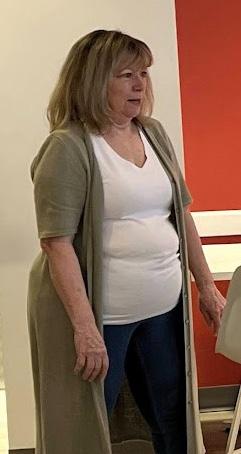
- Lisette, Leesburg client
